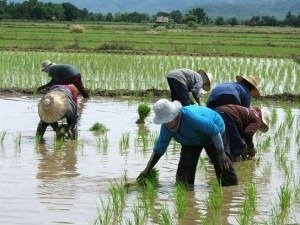BANGKOK — Anti-government protest leader Suthep Thaugsuban said today that a new key reform demanded by the People’s Democratic Reform Committee prior to elections was a “totally logical and reasonable” way to end the current crisis: the counting of any upcountry Thai citizen as 3/5 of one Bangkok citizen in all future government and census functions.
The so-called “3/5 Compromise” proposal would maintain the current Constitution as well as all government ministries and electoral processes, with the minor tweak that any person living outside of the Bangkok metropolitan area would be counted as 3/5 of a human being, entitled to 3/5 of a vote, 3/5 of government services, and 3/5 of legal protection and rights as a Thai.
Speaking from the main protest stage at Rajdamnoen Avenue, Suthep endorsed the proposal as fair and balanced.
“As leaders of true democracy, we are not interested in disenfranchising the uneducated upcountry masses,” he said. “However, as defenders of Thai culture, we simply cannot allow a poor person to have the same say in governance as an educated person with money. It defies all Thai tradition.”

In detailing the proposal to reporters, Suthep claimed that by reducing upcountry votes to 3/5 of their current total, the Parliament would be roughly equally divided between Pheu Thai and Democrat Party MPs, which would create an even playing field for debate and lawmaking.
Additionally, the PDRC secretary-general insisted that allowing north-east and northern citizens 3/5 of personship was actually very generous.
“The average Isaan Thai makes far less than 3/5 of the average Bangkok citizen,” he explained. “So we’re actually rounding up their true value as humans, which proves that we are on the moral and generous side of this war.”
The 3/5 proposal has been greeted with enthusiasm by the PDRC’s supporters as well as many business owners in the capital.
“The filthy Thaksin-supporters deserve nothing, frankly, for betraying the nation and king,” said one protester. “But if allowing them a fraction of meaningful existence can get them out of power, then it’s a good plan.”
“They’ll just have to settle for selling their vote for 3/5 for the previous value,” he added.
According to sources, the proposal is actually a less radical version of an original plan to reduce upcountry voters to 1/5 of a Thai person, while rewarding virtuous persons with high social ranking with multiples of citizenry – up to 10,000 for military generals, CEOs, senators, and abbots, and 1,000,000 for Privy Council members. That plan was reportedly shelved as impractical due to the possibility of loss of face for puu yai who received insufficient multiple votes in accordance with their self-regard.
The 3/5 compromise is being offered as a “final chance” for the Yingluck caretaker government to avoid massive disruptive protests intended to derail the February 2 election.
“Take 3/5, or take nothing,” Suthep threatened.
Academics and several business organizations, however, reserved their judgment of the plan pending more details.
“Applying the 3/5 rule evenly across all government functions would be quite difficult, as many upcountry people would just use the Bangkok house registration of a relative to earn full rights,” suggested Jumsai Nichidapon, a professor of sociology at Thammasat University. “It’s potentially a bureaucratic nightmare.”
Jumsai also wondered whether upcountry Thais would only be entitled to 3/5 of their salary and obligated to serve only 3/5 of their military service.
“Does this mean that when we sell an appliance to an upcountry person, we only have to honor 3/5 of the warranty period, or 3/5 of a refund?” inquired Vinasaya Meekpchaipakorn, president of the Bangkok Business Association. “Obviously we would be in favor of that, but we’d also like to know how we can enforce such laws when it’s easy to buy things using a fake Bangkok ID.”
Vinasaya suggested that the 3/5 law might need some kind of “Grandfather Clause” to ensure that the descendants of upcountry people inherited the 3/5 status.
“We don’t want to see upcountry people’s children descending on Bangkok and changing the balance of things in future generations,” she explained. ”And what if a Bangkok landowner fathered a child with one of his servants. Would that child be worth 4/5?”
In response to reporters’ inquiries, Suthep said that the 3/5 plan was completely viable and sustainable, adding that he believed that subsequent generations of upcountry people should have the possibility of eventually being whole Thais.
“Buddhism teaches us that we move up the karma wheel by our good works,” he said. “If an upcountry Thai wishes to teach his children to love the nation and king, and renounce the evil of Thaksin, he can hope that someday his improved children might move to Bangkok and give birth to their own children, who might be uncorrupted and receive the proper education in Bangkok schools. This new generation, having eliminated the wickedness of upcountry thinking, could cleanse the bloodline and whiten the skin of their lower-caste forefathers, and bring their family name into honor as true Thais.”
While Suthep admitted the idea unconventional, he remained convinced that the reduction of inferior persons to a 3/5 legal status was an idea whose time had come.
“We are making history,” he said. “It’s the 21st Century, after all.”


